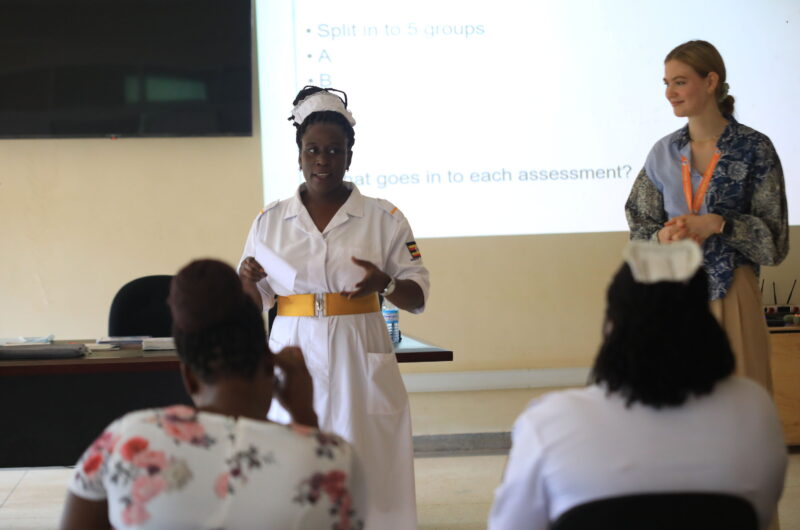Cambridge University Hospitals NHS Foundation Trust (CUH) critical care nurse Elizabeth Walsh reflects on the renewed passion and enthusiasm for her job that a week working alongside Ugandan nurses has given her.
“I qualified at the beginning of the pandemic and working on the frontline was a scary time. I was fortunate to be working in a high-income country where healthcare is free and people were able access the help they required. Countries such as Uganda found themselves stretched: with already limited resources and funding, many people didn’t get the care they needed, despite the hard work of healthcare staff.
My interest in global health peaked during the pandemic and I went on to complete the MSc in Tropical and Infectious Diseases at the Liverpool School of Tropical Medicine, where my love for global health developed further. I was able to gain a true insight into the inequalities across the globe, but also the amazing partnerships that countries have been able to develop to share skills and knowledge.
Global health is also local health. Through guidance, surveillance, and mutual partnerships, we can close that gap in health inequalities to ensure the best possible care is provided for patients far away and within our own communities.
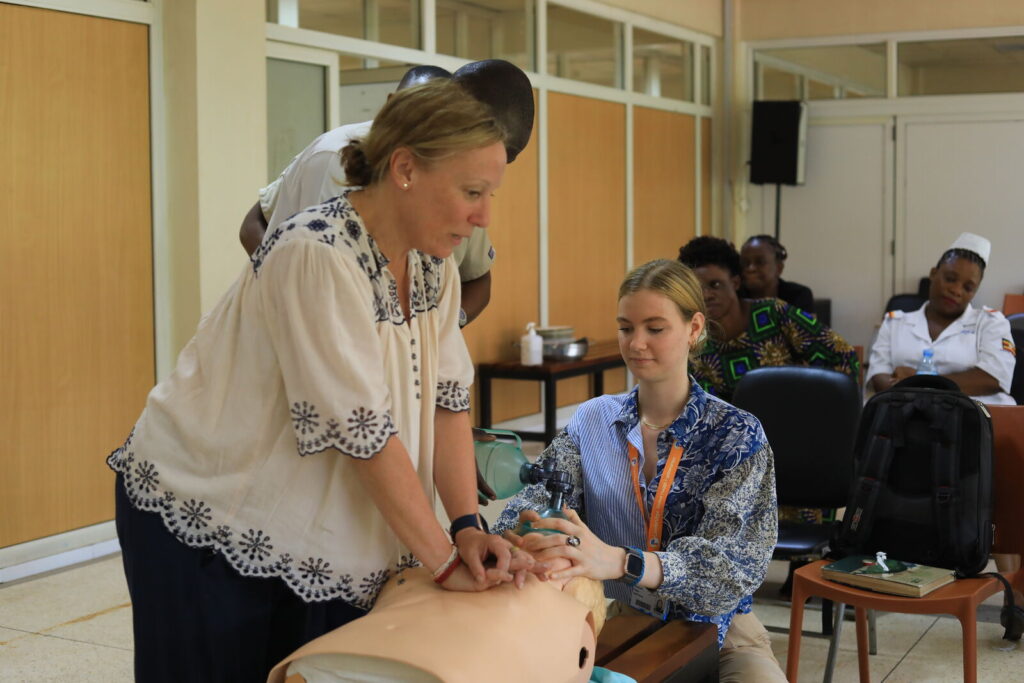
Getting into global health
After working in emergency and acute medicine for three years, I was keen to gain experience in critical care, as well as global health. Some of my previous colleagues told me about the SCALE Critical Care project, which CGHP supports, and this inspired me to apply for my next role at ICU within Addenbrooke’s.
Part of the broader Kampala-Cambridge Health Partnership, SCALE aims to build and support workforce capacity in critical care. It focuses on sustainability and respect, to ensure that both parties are aiming for the same goal while being mindful of our differences. While the friendships will last a lifetime, the end goal is for both parties to become self-sufficient, with future education and health equality within our own critical care units.
The opportunity to participate in the project was a dream come true: I would be able to work an admirable partnership that also aligns with my own values. It would also be an opportunity not only to share my experiences and education, but also to learn new skills and experience healthcare in new settings that would improve the quality of care I provide to my patients.
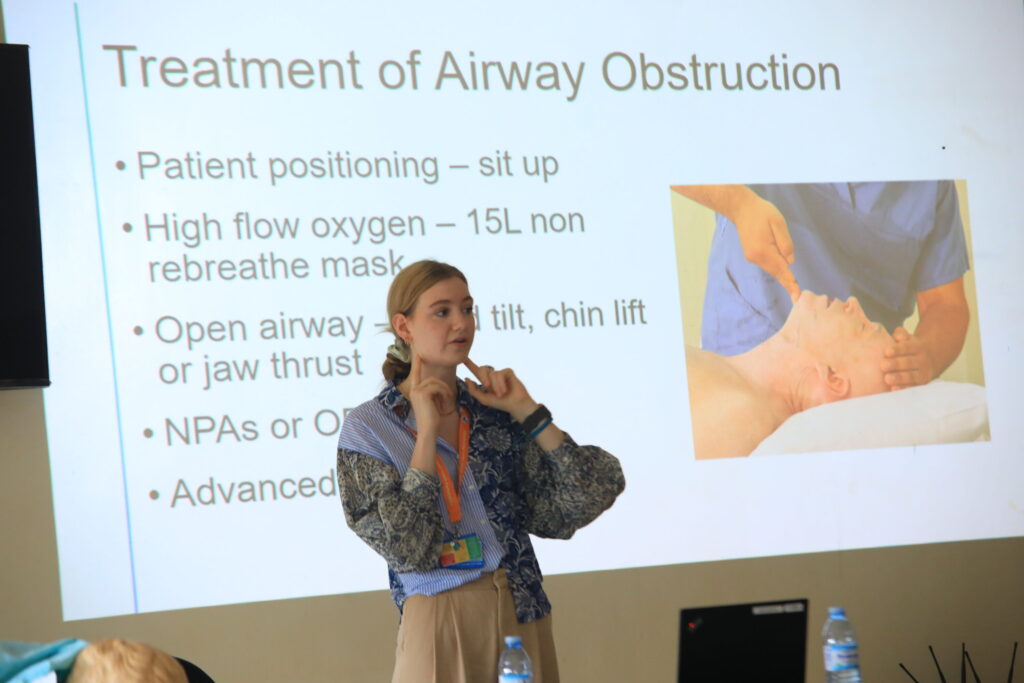
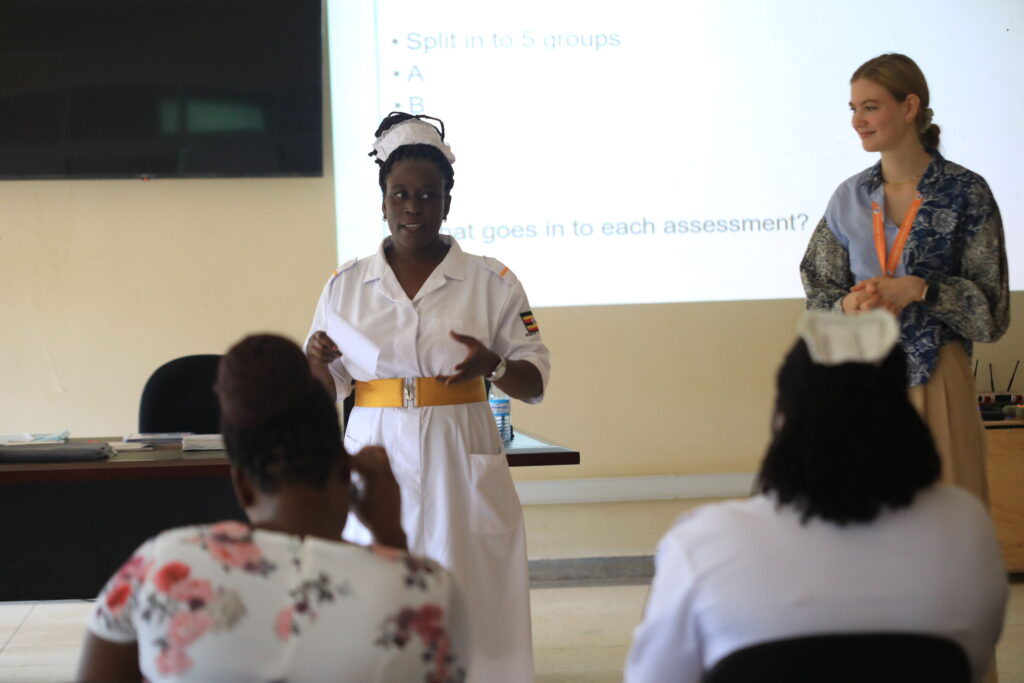
The SCALE project experience
Our first day in Uganda was a public holiday, which allowed us chance to explore Kawempe National Referral Hospital and meet the charge nurses, lead doctors and members of the Ministry of Health.
The tour was eye opening. ICU was originally designed as NICU however after some remodelling, the department was now used as an Adult ICU. The team were incredibly welcoming but most of all they were proud of their department and what they had been able to achieve over the last three years in terms of training, funding, and overall patient care.
The tour also took us to the labour department, the high dependency unit, and recovery. Each department operated with a greater patient ratio than I had experienced in the UK and some areas were limited in space. A common theme within departments was pride among the staff: everyone was so welcoming and proud to show us the day-to-day life within their units.
We were invited to visit the homes of project lead nurses Esther and Martha. We spent time discussing their nursing experience, eating local produce and meeting with their families. They immersed us in their culture and spoke of their goals for the future.
Teaching started the next day. After an introduction to the Kawempe Hospital team and the first group of participants, I delivered the first theory-based presentation, focusing on A-E assessments and handovers as requested by the anaesthetic team. CUH lead midwife Catherine Barlow delivered sepsis training, and critical care education lead Lisa Enoch finished with basic lifesaving skills (BLS) and cardiac rhythms. We then moved the team to simulation training using the BLS protocols to incorporate a quick and effective A-E assessment with CPR.
The day was immensely fun, with lots of engagement from both sides. I was able to learn a lot from the Kawempe team on the protocols and guidelines they used. It was also very insightful to hear how they prioritise deteriorating patients and how a crash call would normally be run on their individual units.
I have always been incredibly happy in my career as a nurse, however the nurses in Kampala gave me a fresh passion and enthusiasm for my job. The pride they had in their own nursing career was utterly infectious and a pleasure to be around, leaving me with nothing but pride in myself and nurses globally. The beauty and strength within the team highlighted the importance of solidifying friendships and connections, to lift one another up and grow as a team.
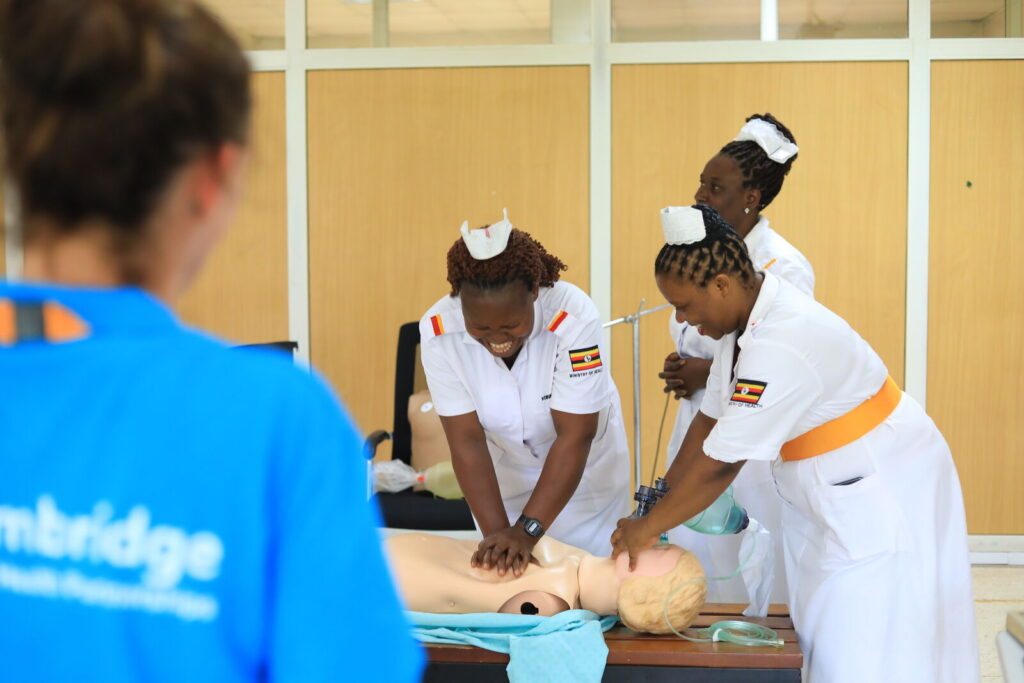
The following day Lisa and Catherine completed a full day of simulation training in at Kawempe Hospital, applying the theory we had taught on day one. Meanwhile I visited Mulago Hospital, the largest public hospital within Uganda, to complete A-E assessments within the ICU department. Ten members of staff joined me as we went bedside to bedside, applying the systematic assessment and discussing our concerns and recommendations for the patients going forward. We talked about the medications used, the ventilators, the use of tracheostomies, the cardiac rhythms and the differences in management between our patients.
The ICU was impeccably clean and appeared to be very well equipped, however few machines could be used due to lack of servicing and missing parts. The unit had 40 beds but operated 20 open beds due to staff shortages. There averaged around three to five members of nursing staff on the floor that worked very fluidly throughout the unit. They used a thorough sterilising system to reuse certain equipment that would otherwise be classed as single use within the UK. This allowed more of the budget to go towards medications and staffing of the department.
The next day, Catherine and I returned to Kawempe to meet our second group and teach the ‘day one’ theory and BLS simulation training again. This group contained more of the ICU team, including ICU doctors, allowing for more department specific discussions.
As well as learning new techniques and views from the Kawempe team, I was also privileged to learn so much from Catherine and her incredible experiences she’s had as a midwife and registered nurse.
Our final day of teaching again saw the team split between the two hospitals, with Catherine and I delivering day two of training for our second group. We spent the afternoon in the ICU, applying the theory and simulation to bedside simulation using a mix of the CPR dummies and group members as example ‘patients’ to practice our assessments and escalation processes.
There was an end-of-week graduation for all the participants where they received certificates and photographs. We were also able to exchange contact details and reflections of the week.
Our last day was a Saturday and an opportunity to see some of the beauty Uganda has to offer. We went on a bike ride, visited local markets, had a group debrief and met lead nurse Martha for dinner.
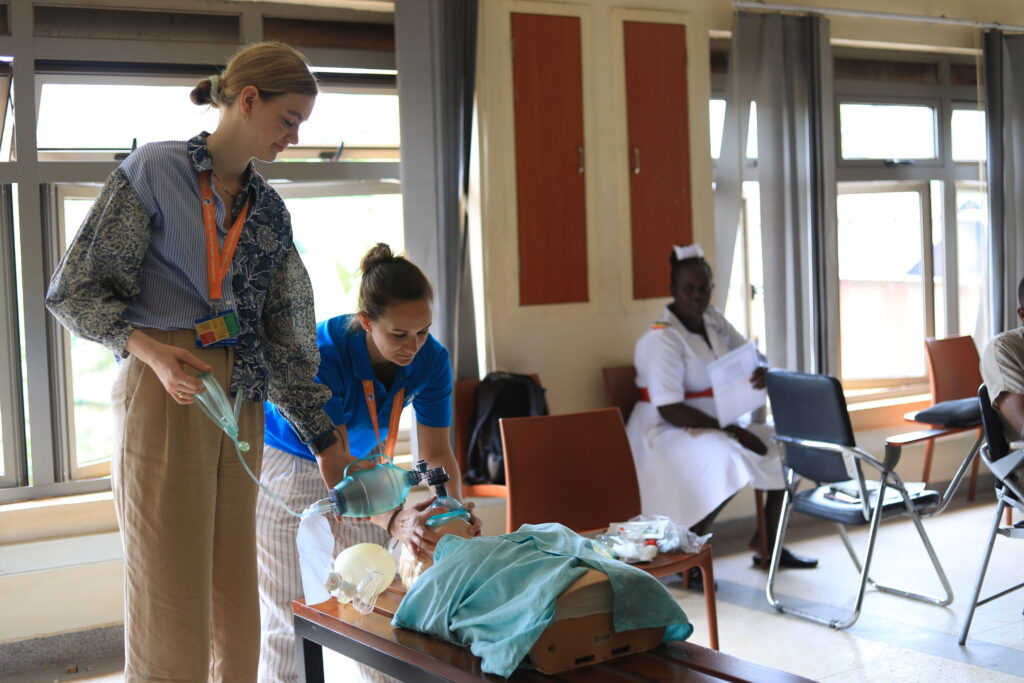
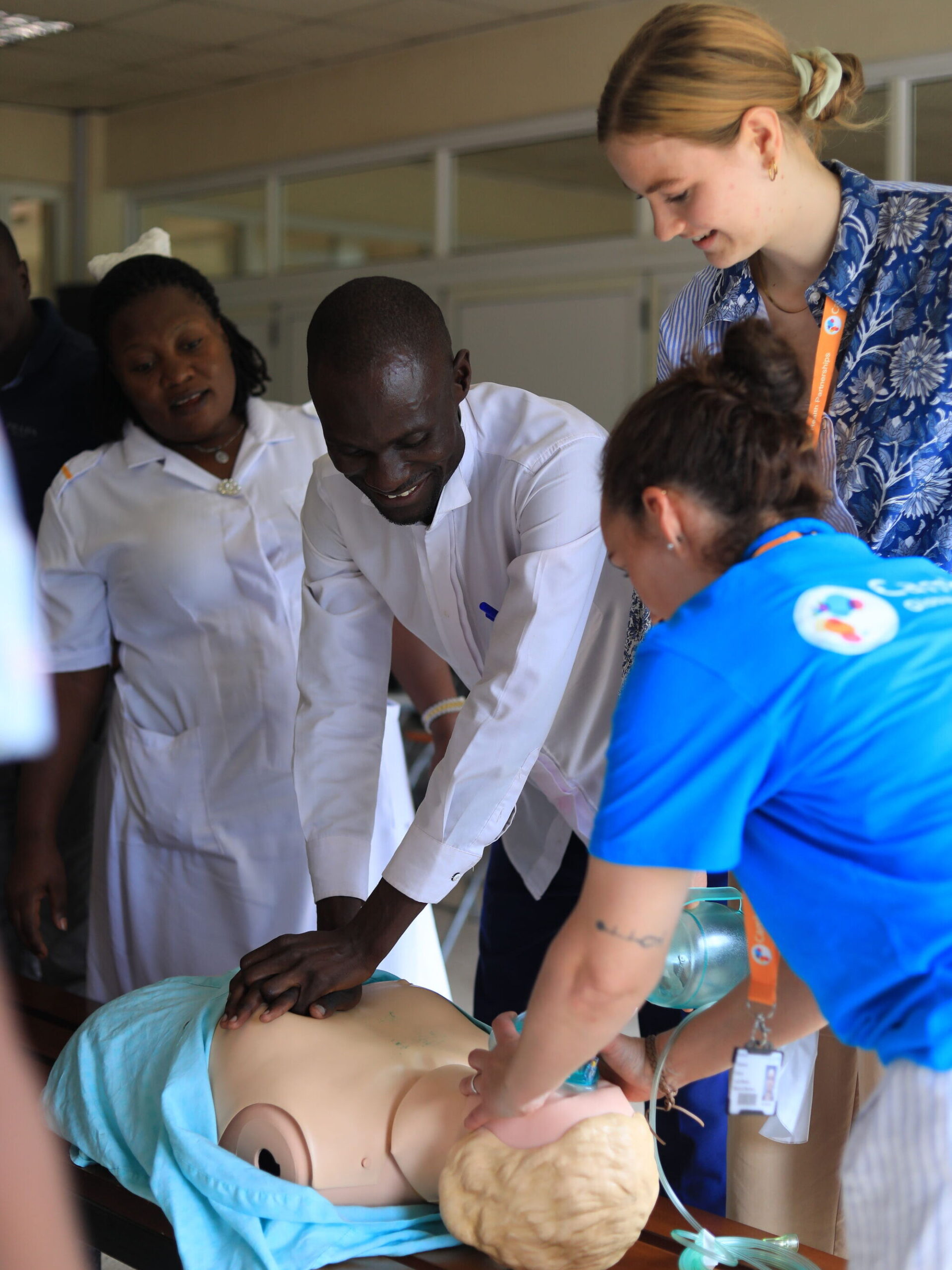
Learning from a different way of working
The teams are really flexible in where they work and staff nurses were less anxious about moving between departments than in the UK. I believe this is partly due to the excellent teamwork they have throughout the entire hospital, that doesn’t differ from department to department. Nurses are happy to discuss their limitations to gain more support from their peers. They also seem to have more experience with rotations, giving them exposure to different patient groups and helping with the ‘hospital teamwork’ mindset as opposed to ‘department-focused teamwork’.
The doctors and nurses worked as one with a very clear mutual respect. They viewed their teams as their ‘families’ and I genuinely believe this allowed for greater, overall job satisfaction. Their pride was easily noted and quite infectious to be around. I went home feeling proud of what I do and proud of my Ugandan colleagues for showing up every day with such love and respect.
While there were clear visual differences between Kawempe and Mulago, both hospitals were similar in their ability to be resourceful. They identified object that could be reused without causing harm and self-sterilised them. They both had equipment logs to identify what equipment comes into the department, what works effectively and what is deemed un-usable. The logs allowed for identifying their limitations in patient care, so they were able to highlight areas of improvement.
As they were limited in surrounding public hospitals, they never turned a patient away. They were very resourceful in formulating plans to ensure they limited patients being referred out to reduce long journeys and limited treatment. They had plans in place for when they had reached ward capacity.
The nurses and doctors that I met were incredibly resilient. I was fortunate to be able to share stories and reflect on the jobs and tasks they do daily. Due to the long journey some women must take to get to the hospitals and the high birth rate, the pressure the teams had on a daily basis was significantly higher than the UK.
We discussed the benefit of an effective debrief and ensuring handovers were clear and consistent to allow for correct information sharing, but also to allow our team members to feel valued and supported. Debriefs are already a key element in UK nursing but the benefits were highlighted to me and gave me a chance to reflect on my own practice and areas of communication that I could improve on.
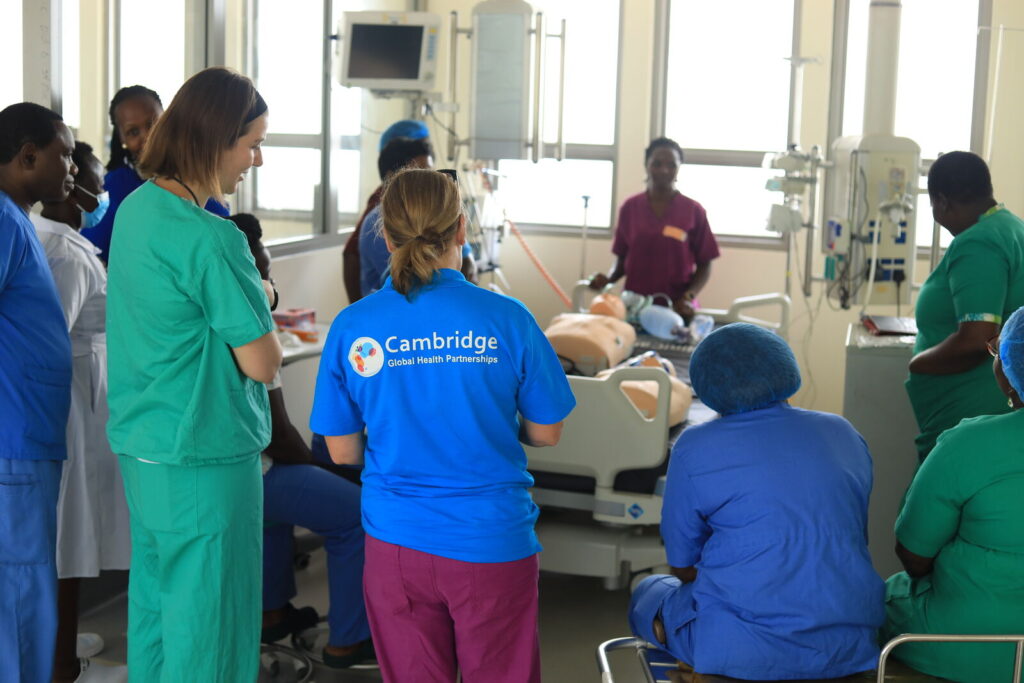
Navigating challenges
Possible challenges were outlined in our pre-departure meeting as an aim to lower barriers on arrival, but one challenge I hadn’t anticipated was my accent. This occasionally caused a breakdown in communication, and I attempted to slow down my speech check in regularly to ensure I was being understood.
The differences in resources were also a challenge. When discussing some lines of treatment or preventions, some of the Ugandan nurses were unable to implement this into their own practice due to limited resources. We attempted to overcome this by having an open discussion on how they would lead a cardiac arrest, using the equipment they had identified, and basing the systematic approach on this list.
Another challenge was timing. A plan had been put in place to make the most of our time, but due to meetings, staff shortages and transportation, most of our day didn’t sit within the plan. While this wasn’t a challenge we could easily fix, it taught me to be adaptable and flexible in my approach.
Personal and professional development
This experience has developed my confidence in so many ways. I was able to prove to myself that I have valuable skills and knowledge worth sharing and can deliver it in a way that was educational and engaging. Due to flight delays, I spent the second day on my own in Mulago Hospital. I was incredibly well supported by the Mulago nurses, however it gave me a sense of pride at the end of the day when I was able to reflect on a successful day of independently training while demonstrating my ability to adapt and work in a totally new environment and still implement a high standard of nursing care.
I have always been incredibly happy in my career as a nurse, however the nurses in Kampala gave me a fresh passion and enthusiasm for my job. The pride they had in their own nursing career was utterly infectious and a pleasure to be around, leaving me with nothing but pride in myself and nurses globally. The beauty and strength within the team highlighted the importance of solidifying friendships and connections, to lift one another up and grow as a team.
As a more junior member of the team, I have also been able to develop my skill in leadership. I hope to implement my leadership skills and teaching technique in the UK and now have more confidence in delegating and supporting others.
This experience was easily the most memorable and proud moment of my career to date. Genuine relationships and connections can only be built by acquiring a full understanding of the day-to-day experience. I went with so many ideas of what I would like to achieve, and it was only once I was in Uganda that I learned to re-evaluate my goals based on real life experience.
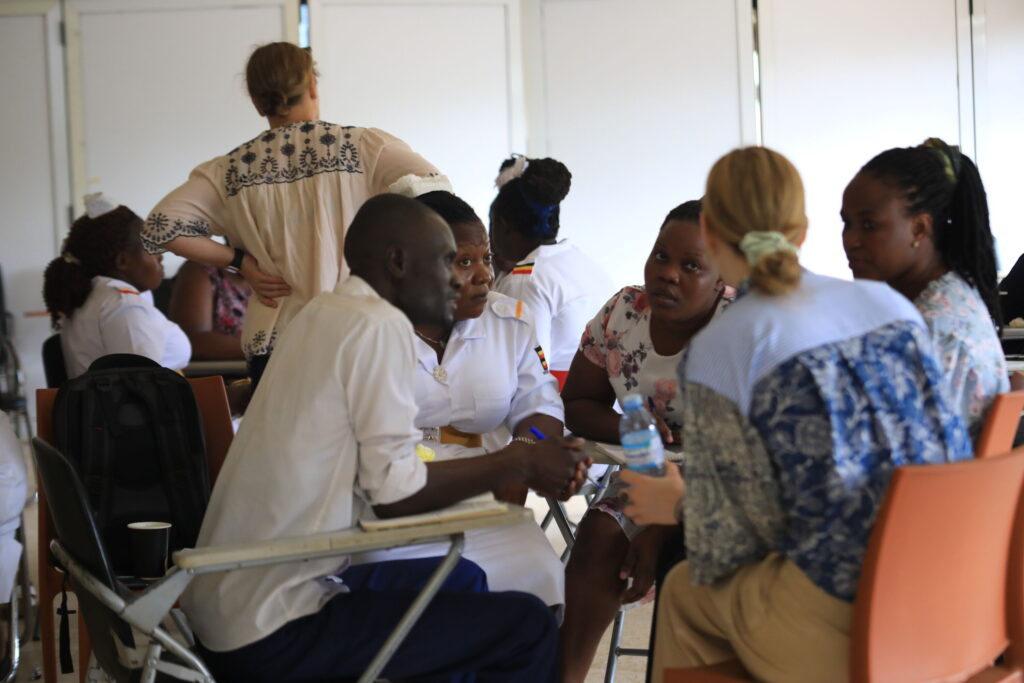
I learnt so many soft skills that I can now implement into my own nursing path. Global health isn’t just about improving the patient care in other countries, its also about improving the patient care in our local communities. Working in global health allows you to develop those skills, gain new perspectives and meet likeminded people from around the globe.
What’s next?
I would like to work with the pharmacy team on the SCALE project to develop a safer and more supported way of nurses administering medication on ICU. I would also like to see the step one competency booklet being implemented and aid the Mulago team in leading the program going forward. I have a keen interest in reducing taboo around palliative care and would like to eventually see this topic more widely discussed to aid patient dignity not just through care but also through end-of-life stages.
I’d also like to consider how some of the learnings from Uganda can be applied to UK hospitals, for example the lack of sedation. Patients were weaned off medications very quickly and much lower doses of medication was used which, from observation, seemed to result in lower cases of delirium and less time on a ventilator. I would also like to see us implement the Ugandan mindset of flexibility and resilience within the UK team. Even in days of difficulty, they all worked as a team with a smile on their faces.”
Find out more about the SCALE Critical Care project, or contact us at info@cghp.org.uk
Return to blogs

